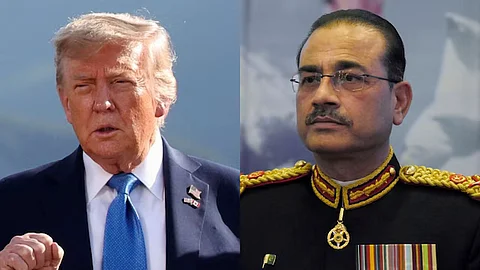

In a surprising diplomatic development, Pakistan has officially nominated former U.S. President Donald J. Trump for the 2026 Nobel Peace Prize, citing his “decisive diplomatic intervention and pivotal leadership” during the recent escalation between India and Pakistan. The conflict, sparked by a deadly terror attack in Jammu and Kashmir’s Pahalgam that left 26 dead, saw several days of intense cross-border shelling before a ceasefire was reached.
The announcement was made by the Pakistan government on X (formerly Twitter):
“Government of Pakistan Recommends President Donald J. Trump for 2026 Nobel Peace Prize. The Government of Pakistan has decided to formally recommend President Donald J. Trump for the 2026 Nobel Peace Prize, in recognition of his decisive diplomatic intervention and pivotal leadership during the recent India-Pakistan crisis.”
The nomination follows Trump’s high-profile meeting with Pakistan’s Army Chief, General Asim Munir—recently elevated to the rank of Field Marshal—at the White House on Wednesday. According to Geo News, the two shared a private lunch, although details of their discussions remain undisclosed. Field Marshal Munir had earlier advocated for Trump’s Nobel nomination, crediting the former U.S. president with helping avert a potential nuclear confrontation in South Asia.
White House spokeswoman Anna Kelly confirmed the visit ahead of time, stating:
“President Trump will host Field Marshal Asim Munir, following Munir’s public call for the president’s nomination for the Nobel Peace Prize for preventing a nuclear war between India and Pakistan.”
The Pakistan government is touting the White House invitation as a major diplomatic success, with state media describing the meeting as a “significant achievement” for Islamabad’s international standing.
The ceasefire came after India launched Operation Sindoor on May 7, targeting terror camps in Pakistan-controlled territory in response to the Pahalgam attack. The operation triggered four days of heavy military exchanges across the Line of Control. By May 10, top military officials from both nations agreed to halt hostilities.
While Pakistan praised Trump’s role in de-escalation, Indian officials assert that their strong retaliatory response compelled Pakistan to seek a ceasefire.
Field Marshal Asim Munir's rise to his current rank marks the first such elevation since General Ayub Khan in 1959, underscoring his growing influence in both domestic and international affairs.